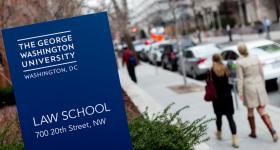GW Law's new Center for Law and Technology offers 'robust' privacy program
The International Association of Privacy Professionals (IAPP) features an articles about the new Center for Law and Technology at GW Law.


The Bernard Center provides education, events, scholarship, and dialogue about intellectual property, privacy, data security, and technology law. Internally, the Bernard Center is divided into two important areas of academic areas within GW Law:
GW Law proudly unveils its Center for Law and Technology, focusing on Intellectual Property and Privacy and Technology Law.
GW Law recently added a new JD Concentration in Privacy, Data Security and Technology (PDT) Law.
GW JOLT will present articles, essays, and student notes on law and technology issues including, intellectual property, privacy, artificial intelligence, cybersecurity, digital health, online social media, behavioral advertising, and other existing and emerging areas of technology related law.
Download the Bernard Center Brochure (PDF)

Scholarships and competitions are available for both programs.
Learn more about this once-in-a-lifetime study abroad opportunity.
Center Faculty Co-Director; Co-Director, Intellectual Property Law Program
rbraun law [dot] gwu [dot] edu (rbraun[at]law[dot]gwu[dot]edu)
law [dot] gwu [dot] edu (rbraun[at]law[dot]gwu[dot]edu)
Center Faculty Co-Director; Bernard Professor of Intellectual Property and Technology Law
dsolove law [dot] gwu [dot] edu (dsolove[at]law[dot]gwu[dot]edu)
law [dot] gwu [dot] edu (dsolove[at]law[dot]gwu[dot]edu)
Center Director; Associate Dean, Intellectual Property Law
jwhealan law [dot] gwu [dot] edu (jwhealan[at]law[dot]gwu[dot]edu)
law [dot] gwu [dot] edu (jwhealan[at]law[dot]gwu[dot]edu)
Center Deputy Director; Bernard Assistant Dean, Privacy and Technology Law
adrienne [dot] fowler law [dot] gwu [dot] edu (adrienne[dot]fowler[at]law[dot]gwu[dot]edu)
law [dot] gwu [dot] edu (adrienne[dot]fowler[at]law[dot]gwu[dot]edu)

GW Law's new Center for Law and Technology offers 'robust' privacy program
The International Association of Privacy Professionals (IAPP) features an articles about the new Center for Law and Technology at GW Law.

"The legal and political questions surrounding Trump's deployment of National Guard troops."
MPR News spoke to Laura Dickinson on the legality of the National Guard deployment.
"'We’re going to kill them': doubts grow over legality of US air strikes in Caribbean"
The Financial Times quoted Laura Dickinson in an article about the ongoing boat strikes.
"Food giants may lean more on lawsuits as private label encroaches on their turf"
Food Dive quoted Robert Brauneis on private-label products in grocery stores.
Please fill out our contact form to get in touch with the Bernard Center.
